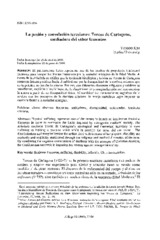La pasión y consolación teresianas: Teresa de Cartagena, mediadora del saber femenino
Autor
Kim, Yonsoo
Editor
UCOPressFecha
2006Materia
Discurso femeninoSufrimiento
Discapacidad
Enfermedad
Tradición cristiana
feminine discourse
Suffering
Disability
Infirmity
Christian tradition
METS:
Mostrar el registro METSPREMIS:
Mostrar el registro PREMISMetadatos
Mostrar el registro completo del ítemResumen
El padecimiento físico representa uno de los medios de propulsión intelectual femenina para romper los límites impuestos por la sociedad misógina de la Edad Media. A través de la Arboleda se ratifica que la tendencia ideológica y teórica de Teresa de Cartagena conserva fuerzas positivas hacia el sufrimiento por la discapacidad de la sordera, mientras que en la práctica no pasaba lo mismo. Por eso, con diferentes discursos religiosos y médicos se manifiestan, explícita e implícitamente, la discriminación y marginalización con que convivía la autora a partir de su discapacidad física. Al combinar las connotaciones negativas de la sordera con los preceptos de la doctrina cristiana, la monja castellana logra imponer su escritura frente a la sociedad misógina. Physical suffering represents nne of the means to launch an intellectual feminine discourse in order to overcome the limits imposed by misogynist medieval society. The Arboleda confirais Teresa de Cartagena's ideological and theoretieal tendency to view suffering as holding a positive value while in practice the same did not occur. The discrimination and marginalization the author lived with because of her physical disability are explicitly and implicitly manifestad through the religious and medical discourses of the time. By combining the negative connotations of deafness with the precepts of Christian doctrine, the Castilian nun succeeds in imposing her writing against misogynist society.

